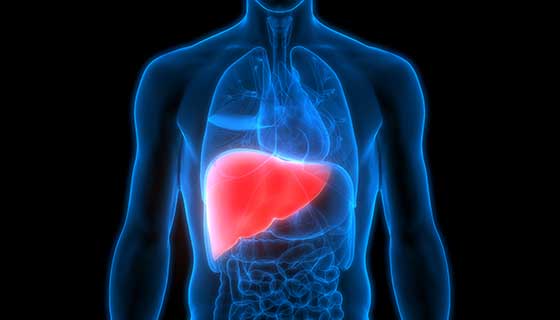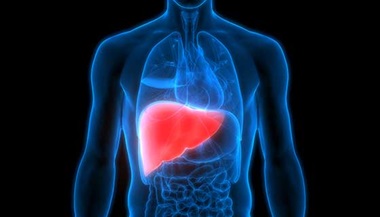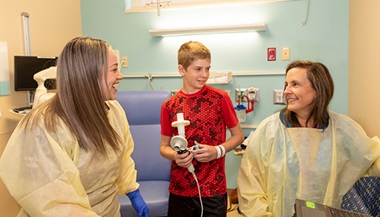Cystic Fibrosis
What is cystic fibrosis?
Cystic fibrosis (CF) is an inherited life-threatening disease that affects many organs. It causes changes in the electrolyte transport system. People with CF have problems with the glands that make sweat and mucus. CF makes mucus thicker. Symptoms start in childhood. On average, people with CF live into their mid to late 30s. But new treatments are increasing life expectancy.
CF affects several organ systems, including:
-
Respiratory system
-
Digestive system
-
Reproductive system
Some people carry the CF gene without being affected by the disease. They often don't know that they are carriers.
How does CF affect the respiratory system?
With CF, there is an abnormal electrolyte transport system. The normal thin secretions in the lungs become very thick and hard to move. These thick secretions raise the risk for frequent respiratory infections.
Respiratory infections that keep coming back lead to more damage in the lungs. Over time, this causes permanent loss of lung function.
Because of the high rate of infection in the lower respiratory tract, people with CF may develop a chronic cough and blood in the sputum. The cough is often worse in the morning or after activity. They can develop lung collapse (pneumothorax).
People with CF also have upper respiratory tract symptoms. Some have nasal polyps that need surgery to be removed. Nasal polyps are small bumps of tissue from the lining of the nose. They can block and irritate the nasal cavity. People with CF also have higher rates of sinus infections.
How does cystic fibrosis affect the digestive system?
CF mainly affects the pancreas. The pancreas secretes substances that aid digestion and help control blood sugar levels.
The secretions from the pancreas also become thick and can clog the ducts of the pancreas. This may cause a decrease in the secretion of enzymes from the pancreas that normally help digest food. A person with CF has trouble absorbing proteins, fats, and vitamins A, D, E, and K.
The problems with the pancreas can get so severe that some of the cells in the pancreas die. Over time, this may lead to glucose intolerance. It may also lead to cystic fibrosis-related diabetes (CFRD). This is a unique type of insulin-dependent diabetes.
Some CF symptoms may be from its effect on the digestive tract. These include:
-
Bulky, greasy stools
-
The lower end of the bowel comes out of the anus (rectal prolapse)
-
Delayed puberty
-
Fat in the stools
-
Stomach pain
-
Bloody diarrhea
The liver may also be affected. A small number of people may develop liver disease. Symptoms of liver disease include:
-
Enlarged liver
-
Swollen belly
-
Yellow color to the skin (jaundice)
-
Vomiting blood
How does CF affect the reproductive system?
Most males with CF have blockage of the sperm canal. This is called congenital bilateral absence of the vas deferens (CBAVD). This results from the thick secretions clogging the vas deferens and keeping them from developing correctly. It causes infertility because sperm can't travel out of the body. There are some newer methods that allow men with CF to have children. Discuss these with your healthcare provider. Women with CF have an increase in thick cervical mucus that may lead to a decrease in fertility. They may also have irregular ovulation. But many women with CF are able to have children.
What causes cystic fibrosis?
CF is a genetic disease. This means that CF is inherited.
Changes (mutations) in a gene called the CFTR (cystic fibrosis transmembrane conductance regulator) gene cause CF. The CFTR mutations cause changes in the body’s electrolyte transport system. Electrolytes are substances in blood that are vital to cell function. The main result of these transport system changes is seen in the body secretions, such as mucus and sweat.
The CFTR gene is large and complex. There are many different mutations in this gene that have been linked to CF.
A person will be born with CF only if 2 CF genes are inherited: 1 from the mother and 1 from the father.
Who is at risk for cystic fibrosis?
Cystic fibrosis is inherited. A person with CF had both parents pass the changed gene to them. The birth of a child with CF is often a total surprise to a family. Most of the time there is no family history of CF. Caucasian people are more likely to have CF than people of African, Asian, or Hispanic ancestry.
What are the symptoms of cystic fibrosis?
Symptoms can be different for each person. The severity of symptoms can vary, too. Symptoms may include:
-
Thick mucus that clogs certain organs such as the lungs, pancreas, and intestines. This may cause malnutrition, poor growth, frequent respiratory infections, breathing problems, and ongoing (chronic) lung disease.
Many other health problems can point to cystic fibrosis, as well. These include:
-
Sinusitis
-
Nasal polyps
-
Clubbed fingers and toes. This means thickened fingertips and toes because of less oxygen in the blood.
-
Collapsed lung, often due to intense coughing
-
Coughing up blood
-
Enlargement of the right side of the heart due to increased pressure in the lungs (Cor pulmonale)
-
Belly pain
-
Too much gas in the intestines
-
The lower end of the bowel comes out of the anus (rectal prolapse)
-
Liver disease
-
Diabetes
-
Inflammation of the pancreas (pancreatitis) that causes severe pain in the belly
-
Gallstones
-
Congenital bilateral absence of the vas deferens (CBAVD) in males. This causes blockages of the sperm canal.
Babies born with CF often show symptoms by age 2. But some children may not show symptoms until later in life. The following symptoms may mean a child has CF. Babies with these signs may have more testing for CF:
-
Diarrhea that does not go away
-
Bad-smelling stools
-
Greasy stools
-
Frequent wheezing
-
Frequent pneumonia or other lung infections
-
Persistent cough
-
Skin that tastes like salt
-
Poor growth despite having a good appetite
The symptoms of CF may seem like other conditions or health problems. See a healthcare provider for a diagnosis.
How is cystic fibrosis diagnosed?
All U.S. states require that newborns be tested for CF. This means that parents can know if their baby has the disease. They can take precautions and watch for early signs of problems. Most cases of cystic fibrosis are found during newborn screening. Babies will have a full health history and physical exam.
Tests for CF include a sweat test to measure the amount of salt (sodium chloride) present. This test may be used if a person has symptoms of CF or if a newborn screening suggests that a baby may have CF. Higher than normal amounts of sodium chloride suggest CF. Other tests depend on which body system is affected. These tests may include:
-
Chest X-rays, ultrasound, and CT scans
-
Blood tests
-
Lung function tests
-
Sputum cultures
-
Stool tests
For babies who don't make enough sweat, blood tests may be used.
How is cystic fibrosis treated?
There is currently no cure for CF. Scientists are investigating gene therapy. Some patients with advanced disease may be considered for surgeries like lung and pancreas transplant.
Goals of treatment are to ease symptoms, prevent and treat complications, and slow the progress of the disease.
Treatment generally focuses on the following 2 areas.
Managing lung problems
This may include:
-
Physical therapy
-
Airway clearance therapy, including chest physical therapy, to loosen and clear mucus
-
Medicines to thin mucus and help breathing
-
Antibiotics to treat infections
-
Anti-inflammatory medicines
Lung transplant may be a choice for people with end-stage lung disease. The type of transplant done is often a heart-lung transplant or a double lung transplant. Not everyone is a candidate for a lung transplant. Discuss this option with your healthcare provider.
Managing digestive problems
This may include:
-
A healthy diet that's high in calories
-
Pancreatic enzymes to aid digestion
-
Vitamin supplements
-
Treatments for intestinal blockages
What are possible complications of cystic fibrosis?
CF has serious complications, including:
-
Worsening lung function, leading to the inability to do daily activities
-
Lung infections
-
Lung collapse (pneumothorax)
-
Inflammation of the pancreas
-
Cirrhosis (liver disease)
-
Vitamin deficiencies
-
Inability for a child to grow and develop (failure to thrive)
-
Infertility
-
Cystic fibrosis-related diabetes (CFRD)
-
Gastroesophageal reflux disease (GERD). With this disease, stomach contents rise up into the esophagus and can cause serious damage.
Can cystic fibrosis be prevented?
Cystic fibrosis is caused by an inherited gene change (mutation). Testing for the CF gene is recommended for anyone who has a family member with the disease. It is also advised for someone whose partner is a known carrier of CF or affected with CF.
Testing for the CF gene can be done from a small blood sample. Or it can be done from a cheek swab. This is a brush rubbed against the inside of your cheek to get cells for testing. Labs generally test for the most common CF gene mutations.
There are many people with CF whose mutations have not been identified. Experts have not discovered all the genetic errors that cause CF. This means that a person can still be a CF carrier even if no mutations were found by testing. There are limits to CF testing.
Two people who are carriers of the CF gene have a 1 in 4 chance of having a child with CF. If both partners have the CF gene and are thinking about having a child, they have some choices:
-
Choose prenatal diagnosis. This means the baby can be checked for CF between 10 to 13 weeks and 15 to 20 weeks during pregnancy.
-
End a pregnancy.
-
Prepare to have your child with CF. Talk to healthcare providers and parents of children with CF.
-
Prepare to establish a treatment plan for your child with CF. Talk to healthcare providers about what your newborn's needs may be.
-
Don't become pregnant.
-
Explore surrogacy, adoption, or other ways to start a family.
Living with cystic fibrosis
If you have been diagnosed with CF, here are some ways to help manage it:
-
It's important to stay up-to-date with vaccines. They reduce the risk of infection. Ask your healthcare provider what vaccines you need. This may include the influenza, COVID-19, and pneumococcal vaccines.
-
You may need to take inhaled antibiotics for the long term to prevent lung infections.
-
You may need medicines to help with digestion.
-
Your healthcare provider may advise vitamin and mineral supplements.
-
The physical, emotional, and financial stress that CF places on a family is enormous. Ask your healthcare provider for resources to help support your family and manage the disease. Online and in-person family support groups and peer support groups for the person with CF can also be very helpful.
Key points about cystic fibrosis
-
Cystic fibrosis (CF) is an inherited life-threatening disease that affects many organs. It causes changes in the electrolyte transport system.
-
People with CF have problems in the glands that produce sweat and mucus.
-
CF causes thick mucus that clogs certain organs such as the lungs, pancreas, and intestines. This may cause malnutrition, poor growth, frequent respiratory infections, breathing problems, and chronic lung disease.
-
All U.S. states require that newborns be tested for CF. This is how most cases are diagnosed.
-
There is no cure for CF. Goals of treatment are to ease symptoms, prevent and treat complications, and slow the progress of the disease.
Next steps
Tips to help you get the most from a visit to your healthcare provider:
-
Know the reason for your visit and what you want to happen.
-
Before your visit, write down questions you want answered.
-
Bring someone with you to help you ask questions and remember what your provider tells you.
-
At the visit, write down the name of a new diagnosis and any new medicines, treatments, or tests. Also write down any new instructions your provider gives you.
-
Know why a new medicine or treatment is prescribed and how it will help you. Also know what the side effects are.
-
Ask if your condition can be treated in other ways.
-
Know why a test or procedure is advised and what the results could mean.
-
Know what to expect if you do not take the medicine or have the test or procedure.
-
If you have a follow-up appointment, write down the date, time, and purpose for that visit.
-
Know how you can contact your provider if you have questions. Ask how to contact your healthcare team on weekends, holidays, and evenings in case you have urgent concerns.




